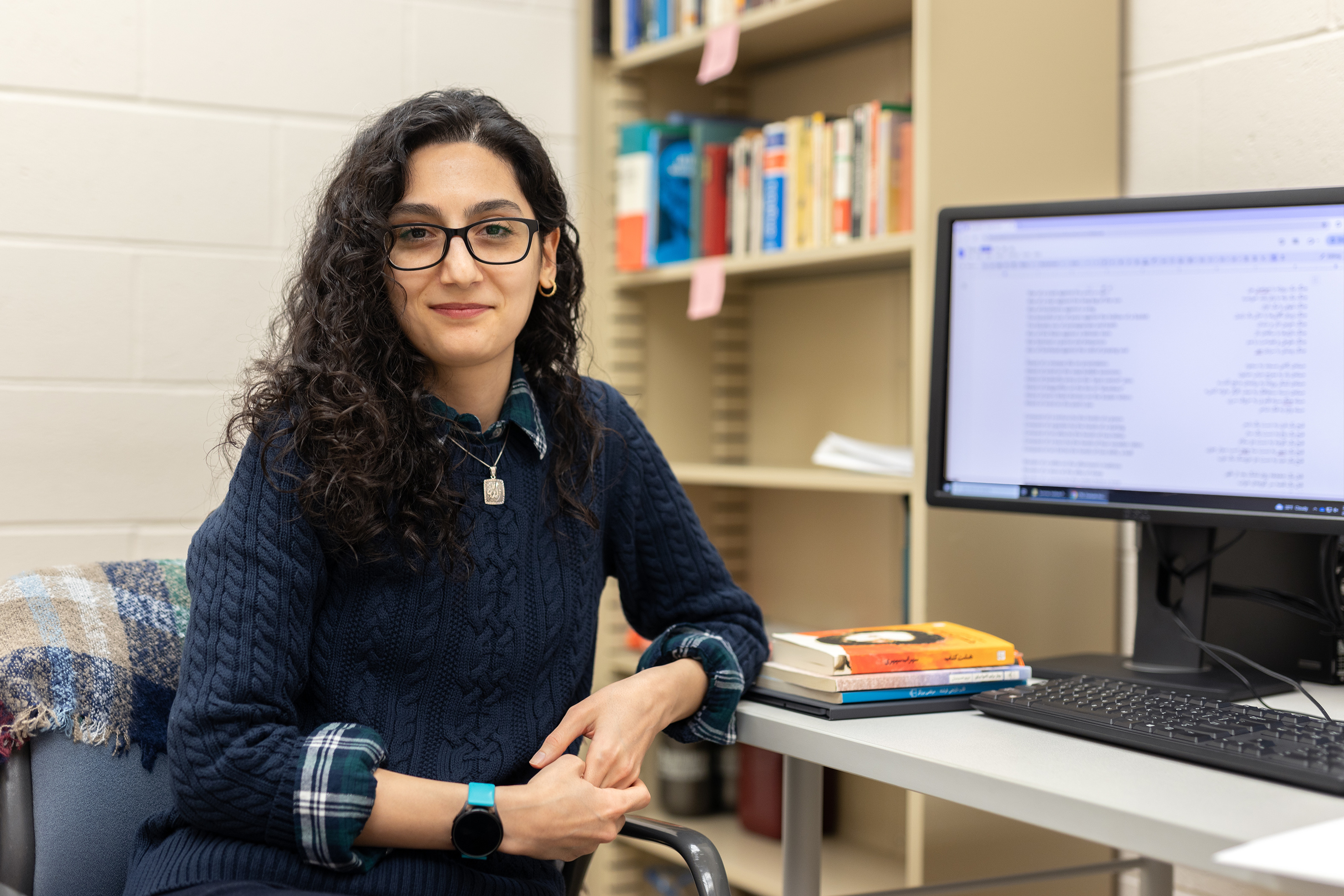
Ara Javaheri was figuratively existing in the middle of her triangle of happiness – literature, translation, and English – when she realized that something was missing in her life’s literary work.
For someone who always has had a Farsi book to read in one hand and an English one to translate in the other, she hadn’t yet shared the impactful stories of Iranian authors with the world.
“I keep reading Iranian literature, especially the modern and contemporary books, and I’m always so shaken that these are good books, and no one knows about them outside of our borders,” says Javaheri, a native of Sanandaj, Iran. “Our writers write from the point of view of whatever is happening to them in Iran. We have been through so much, especially in the past few decades.”
As an MFA student in the University of Iowa’s Literary Translation Program, Javaheri is filling that void by translating Farsi texts into English. Javaheri says Iranian authors draw on their experiences under Iran’s political situation.
Javaheri’s translation work at the UI brings these stories to light.
“We are being cut off from the rest of the world, because of our politicians. Whatever is happening inside Iran remains inside,” says Javaheri, who was awarded an Iowa Arts Fellowship and MFA Summer Fellowship from the Graduate College. “When I translate something for the workshop here, it is so full of everything we have in our culture, and people are learning that for the first time. In Iran, did you know we use a different calendar? Did you know our days of the week are different? The real people of Iran exist inside the stories. Through my translation, I can show you we are just like ordinary people. There’s no difference between us.”
For her final thesis project due this spring, Javaheri is translating into English a collection of ten short stories written by Farsi authors. These short stories deal with social and cultural issues, including spouses going through hardships and a story narrated by a corpse who is observing what happened to his body after his death.
After earning her MFA, Javaheri plans to pursue her PhD at Washington University in St. Louis, MO.
“Iran, the second most populous country in the Middle East, has had a long and luminous cultural history,” says Aron Aji, director of the UI’s translation programs and Javaheri’s advisor. “Yet each year only two or three books of Iranian literature in translation get published in the U.S. We need AJ (Ara Javaheri) and other translators to help reverse this trend.”
The art of translating
Javaheri’s general rule of translation is translating what’s on the page. She also is aware of any messaging in the text beyond what’s in print.
“AJ’s first-person knowledge of contemporary lranian life and culture enables her to translate not just the text on the page, but also the sensations and experiences that give shape to the text,” Aji says.
All authors and translators in their home country are required to obtain a permit from Iran’s Ministry of Culture and Islamic Guidance to publish a book. Javaheri says writers are not allowed to write about such issues as sex, drugs, and alcohol.
“You must consider Islam and the politics. There is censorship that happens,” Javaheri says. “At the same time, writers say what they want to say in a language that won’t get them in trouble. I can’t expand on that text because it’s betraying the text.”
All approved books and translations are housed in the National Library in Tehran.
Growing up as a translator
Javaheri says citizens in her home region of western Iran technically grow up as translators, speaking both Kurdish and Farsi.
“I was trying to translate everything we had in Kurdish to my Farsi-speaking friends,” Javaheri says. “We are a community that all lives together. I was born in the Kurdish province of Iran. Then we learned Farsi in school. The official education in Iran is all in Farsi.”
In her early teen years, Javaheri attended private school and began learning English. She says learning English is important for citizens in Iran.
After high school, Javaheri attended a prestigious university in Iran, Allameh Tabataba’i University of Tehran, where she earned a bachelor’s degree in English Literature in 2011. Since then, she has worked as a fulltime translator, publishing seventeen novels from English to Farsi. Now, she’s in the United States for the first time, studying at the University of Iowa.
“Literature for me is a form of escape,” Javaheri says. “Whenever I’m so tired or fighting a big fight, I need to disconnect from reality and go into a different world for a few minutes. I enjoy being inside the world of stories. It’s even better if I can do it as a job.”